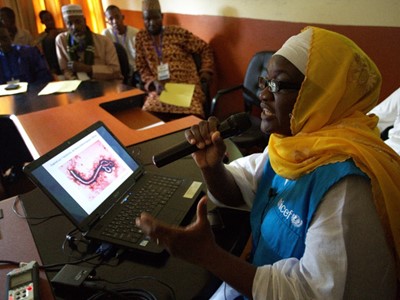Cover image: © UNICEF/NYHQ2014-1502/La Rose
This course, developed in 2014, provides UNICEF staff with key facts about Ebola, promotes safe preventative practices, and offers an overview of the support in place for affected staff.
Learning objectives
At the end of this course, you will be able to:
- Explain what Ebola is, its symptoms, modes of transmission, and how it can be stopped.
- Adopt critical preventive and protective measures when in high-risk areas.
- Take actions that contribute to keeping you and others safe.
- Complete the activities required of you before and after deployment to an Ebola-affected country.
- Respond appropriately if you develop Ebola-like symptoms.
- Understand what care and support is provided to UNICEF staff and their families.
Audience
This course is open to all staff, both in Ebola-affected countries and elsewhere. It can be of particular interest to colleagues planning to travel to areas currently affected by the outbreak, and those already working in the region.
Length
It should take you about 90 minutes to complete this self-paced course. Each module is 10 to 30 minutes long.
Methodology
The course is structured so that each module can be taken on its own. The four modules present data from official sources (i.e., WHO, CDC, UN Emergency Preparedness & Support Team), through the use of diverse media, including videos, animations, and infographics. Each module includes opportunities for reflection and knowledge checks.
Structure
The course is composed of four modules:
Module 1: Facts about Ebola. This includes a history of the virus, symptoms, and modes of transmission.
Module 2: Ebola: Prevention and Protection. This offers practical guidelines on how to protect yourself from the virus, and how to best prepare, if you work in an affected area.
Module 3: Working in an Ebola-affected Country. This covers key information for staff travelling to, and departing from, Ebola-affected locations, as well as practical advice for colleagues currently working in the area.
Module 4: Dealing with Ebola-like Symptoms. This includes practical information on what to do if you suspect you may have contracted Ebola, and an overview of the measures UNICEF has in place to support affected staff.
Other information
To keep up to date with the spread of the disease and its impact in the country where you work, please refer to the following additional resources:
- United Nations Emergency Preparedness and Support Team’s website
- Ebola micro-site on ICON
- UN Global Ebola Response website
- US Centers for Disease Control and Prevention’s (CDC) Ebola pages
Contact details
You can address your questions related to the course to agora@unicef.org
